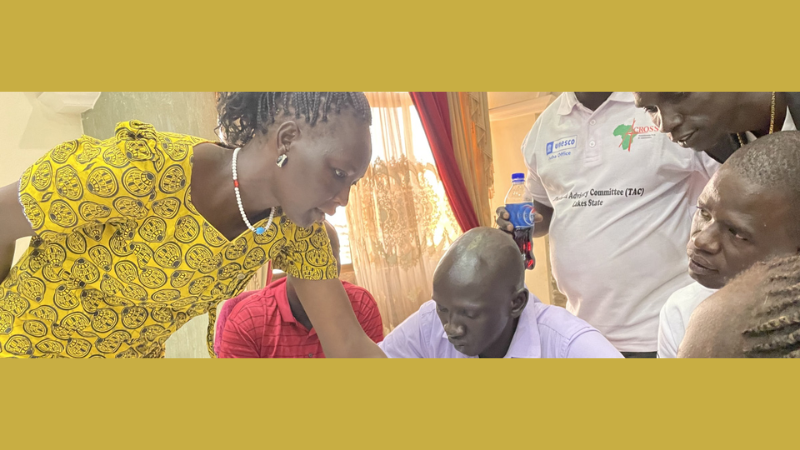
In coordination with the Ministry of General Education and Instruction (MoGEI) of South Sudan and UNESCO Juba Office, UNESCO-UNEVOC worked to advance green and gender-transformative practices in TVET institutions across South Sudan.
With funding support from the Swedish International Development Agency (SIDA), the initiative was carried out as part of a wider project implemented by UNESCO, the Strengthening Technical and Vocational Education and Training in South Sudan. The project aimed at improving TVET governance, modernizing curricula, building teacher capacity and creating robust partnerships with civil society and industry. A key focus was to equip educators and institutions with tools to embed sustainability and gender equity in South Sudan’s economic development.

Why TVET in South Sudan matters?
One of the world’s youngest independent nations, South Sudan faces significant social and economic challenges, including political instability, climate crises, population displacement and high unemployment rates. These challenges disproportionately affect women, girls and youth, who face barriers to education and workforce participation.
TVET has been identified as a critical lever for change – capable of equipping young people with green skills for sustainable industries, while promoting gender equity. UNESCO’s interventions was aimed at breaking cycles of poverty, creating inclusive economic opportunities and preparing South Sudan for a greener, more equitable future.
A transformative agenda
Component 2 of the Strengthening TVET through greening and gender development in South Sudan project successfully mobilized and guided green and gender-transformative development in TVET in South Sudan by:
Reviewing of the current state of TVET and identifying opportunities for development.
Facilitating the adaptation of existing guidance frameworks for greening TVET and gender transformation and their integration in TVET pedagogical and institutional practices.
Piloting resources for the purpose of sensitization and design of training in South Sudan.
Managing high-level and practical support, including through contextualized versions of guidelines on greening and gender-transformative TVET and teaching and learning resources.
What do stakeholders say?
A baseline study was carried out by UNESCO-UNEVOC. It asked what stakeholders considered as challenges and pathways to enable TVET to accelerate a green, gender-empowered and climate-resilient agenda for inclusive and sustainable economies.
The study highlighted green skills gaps in priority industries and found that current TVET provision was insufficient to equip young people with the skills necessary to support the green transition in South Sudan. There was no systematic approach to greening curricula and training, it noted, and limited professional development for teachers and trainers.
It also found that gender transformation across the country’s 200 TVET and vocational training centres was not only necessary but a matter of urgency, with women under-represented in all aspects of tertiary education, including in staff numbers, academic rankings, student population, STEM (science, technology, engineering and mathematics) subjects and postgraduate studies. Less than a third of TVET student enrolment is female, with numbers even lower in STEM courses.
While there are some green and gender-related activities in different stages of development, no policies are in place to green TVET or to make it gender-transformative. Other challenges include the lack of regulatory frameworks, weak engagement among stakeholders, inadequate funding, poor coordination, inadequate teaching and learning materials, a lack of training for teachers and trainers, insufficient infrastructure and weak processes and structures connecting TVET to the world of work
The study makes recommendations to support TVET institutions, teachers and trainers in integrating greening and gender empowerment into pedagogical and institutional practices, including stronger regulatory and policy frameworks, capacity building for TVET instructors, increased investment in green and gender-responsive infrastructure and more engagement with industry and other partners.
Making transformation a reality
To address these issues, two sets of guidelines have been published to support the development of green and gender-responsive TVET curricula, training and resources. Together, they aim to equip national institutions, teachers and trainers with the skills, capacities and resources they need to provide quality green and gender transformative TVET.
Guidance for TVET institutions in South Sudan
UNESCO-UNEVOC’s guidelines on greening TVET provide tools for integrating greening into programmes, transforming institutional culture, curricula, operations, professional development and stakeholder engagement. These guidelines help TVET trainers, managers and stakeholders ensure their programmes reflect greening principles and foster a culture of sustainability, empowering educators and learners to contribute to a greener future.
The guide highlights the strategic importance of greening TVET for South Sudan’s growth, exploring social context, challenges and opportunities. It identifies entry points for greening skills and training as well as key enablers at policy and institutional levels, offering a roadmap for making greening part of TVET's institutional DNA.
The guidelines on gender transformation in TVET aim to empower marginalized communities, especially women and girls, through equitable and inclusive learning pathways. They support TVET educators, institutions and policymakers in addressing gender disparities and creating a gender-transformative TVET system that removes barriers to participation and completion.
Gender-transformative TVET seeks to transform stereotypes, attitudes, norms and practices by challenging power relations and raising awareness of inequality and oppression. The guide outlines strategies for gender transformation, including a whole-system approach, equitable access and participation and gender-sensitive pedagogies, curricula and assessment. It provides indicators and templates to guide institutions through the process, from leadership to course-to-work transitions. Both guides are accompanied by training manuals for facilitators and instructors.
Greening TVET – guidelines for institutions in South Sudan
These Greening TVET guidelines provide a comprehensive framework to promote sustainable development within TVET institutions. By showing how to embed environmental sustainability and gender equity into institutional practices, the guidelines aim to e ...
South Sudan’s future depends on creating opportunities for its young people to thrive in sustainable, inclusive economies. By fostering green skills and gender equity through TVET, UNESCO-UNEVOC and its partners are laying the foundation for long-term development.
Stakeholders, including educators, policy-makers and industry leaders, are encouraged to champion this transformative agenda. With continued collaboration, South Sudan can leverage its TVET system to drive economic growth, social equity and environmental resilience.
This article was written for UNESCO-UNEVOC by Jacqueline Lawless, UNESCO-UNEVOC Consultant


